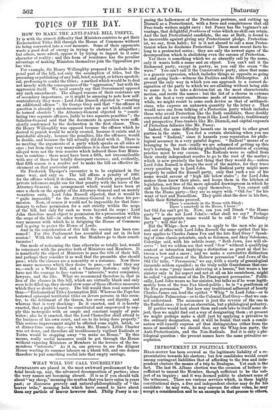TOPICS OF THE DAY.
HOW TO MAKE THE ANTI-PAPAL BILL USEFUL. IT is with the utmost difficulty that Ministers contrive to get their Ecclesiastical Titles Bill through the House of Commons without its being converted into a real measure. Some of their opponents waste a good deal of energy in trying to obstruct it altogether ; but others, more adroit, oppose it by trying to impart to it some character of reality ; and this form of resistance has the peculiar advantage of making Ministers themselves join the Opposition pro hac vice.
For example, Sir Henry Willoughby proposed to include in the penal part of the bill, not only the assumption of titles, but the procuring or publishing of any bull, brief, rescript, or letters apostoli- cal, professing to confer the titles ; a method which would be to deal not merely with the consequences of the " aggression," but with the aggression itself. We need scarcely say that Government opposed any such amendment. The alleged reasons of their resistance are of secondary importance, or it might be amusing to note how self- contradictory they were : Lord John Russell objected to " creating an additional offence " ; Sir George Grey said that " the offence in question is already a misdemeanour under an act which could not be termed obsolete "; the Attorney-General objected to " consti- tuting two separate offences, liable to two separate penalties " ; the Solicitor-General said that the documents in question were suffi- ciently condemned by the declaration in the first clause. Thus, Biz- Henry Willoughby was opposed because the offence which he desired to punish would be newly created, because it exists and is punishable already, because the penalties, like the offences, would be double, and because the bill actually did deal with it. There is no meeting the arguments of a party which speaks on all sides at once ; but from that very manysidedness it is clear that the reasons alleged were not the true reasons which induced those four Minis- ters to combine : there must have been a fifth, not irreconcileable with any of those four totally discrepant excuses ; and, evidently, that fifth reason is a resolve not to make the bill an effective in- strument on that particular point. Sir Frederick Thesiger's encounter is to be explained in the same way, and only so. The bill affixes a penalty of 1001. for the offence which it declares, and Sir Frederick proposed that private informers might sue for that penalty with the leave of the Attorney-General ; an arrangement which would have been at once a check on the apathy of the AttornerGeneral and on merely vexatious suits. Lord John Russell objected, that it would be " quite impossible" for the Attorney-General to refuse his per- mission. Now, of course it would not be impossible for that func- tionary to refuse permission for a suit strictly within the scope of the bill, but only for such as were beyond its scope : Lord John therefore must object to permission for a prosecution within the scope of the bill—in other words, to the enforcement of this very measure with which he is fatiguing the House of Commons and is going to pester the House of Lords. And in the consideration of this bill the session has been con- sumed ! For this Parliament has assembled and sat in its last session ! With this tale of work the Members go to their consti- tuencies !
One mode of redeeming the time otherwise so totally lost, would be consonant with the practice both of Ministers and Members. It is manifestly the object of Ministers to pass the title of their bill, and perhaps they consider it as well that the preamble also should pass ; while the clauses are a nonentity or a nuisance. Now there are many measures which they desire to pass,—at least they say so,—such as a Water Bill, and a Chancery Reform ; only they have not the courage to face various " interests " water companies,
lawyers, and the like. What we recommend "interests,"
is, that in lieu of ihe clauses in this bill, which are virtually blank and only seem to be filled up, they should stow some of those effective measures which they so desire to carry. The bill would then read somewhat thus—"Ecclesiastical Titles Assumption Bill : Whereas the Pope has bestowed episcopal territorial titles on divers persons in this coun- try, to the detriment of the Queen, her crown and dignity, and whereas that is very shocking : Be it enacted, and it is hereby enacted, that a public board be constituted and empowered to sup- ply this metropolis with an ample and constant supply of pure water; also be it enacted, that the Lord Chancellor shall attend to the business of his own court, and see to its being done properly." This serious improvement might be effected some night, latish, or at dinner-time some day,—as when Mr. Hume's Little Charter was set down, and therefore all troublesomely vigilant Radicals or Tories would be stopping away "to make no H' onse." By this means, really useful measures could be got through the House without exposing Ministers or Members to the terrors of the tre- mendous " interests." As it is, one grieves to see the diligent House wasting its summer labours on a blank bill, and one desires therefore to put something useful into that empty carriage.


























 Previous page
Previous page